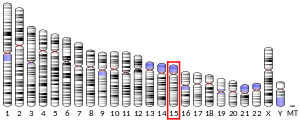From Wikipedia, the free encyclopedia
Protein-coding gene in the species Homo sapiens
Makorin ring finger protein 3 is a protein that in humans is encoded by the MKRN3 gene .[ 5]
The protein encoded by this gene contains a RING (C3HC4) zinc finger motif and several C3H zinc finger motifs. This gene is intronless and imprinted, with expression only from the paternal allele. Disruption of the imprinting at this locus may contribute to Prader–Willi syndrome . An antisense RNA of unknown function has been found overlapping this gene.[citation needed
Jong MT, Gray TA, Ji Y, Glenn CC, Saitoh S, Driscoll DJ, Nicholls RD (1999). "A novel imprinted gene, encoding a RING zinc-finger protein, and overlapping antisense transcript in the Prader-Willi syndrome critical region" . Hum. Mol. Genet . 8 (5): 783– 93. doi :10.1093/hmg/8.5.783 PMID 10196367 . Abreu AP, Dauber A, Macedo DB, Noel SD, Brito VN, Gill JC, Cukier P, Thompson IR, Navarro VM, Gagliardi PC, Rodrigues T, Kochi C, Longui CA, Beckers D, de Zegher F, Montenegro LR, Mendonca BB, Carroll RS, Hirschhorn JN, Latronico AC, Kaiser UB (2013). "Central precocious puberty caused by mutations in the imprinted gene MKRN3" . N. Engl. J. Med . 368 (26): 2467– 75. doi :10.1056/NEJMoa1302160 . PMC 3808195 PMID 23738509 . Settas N, Dacou-Voutetakis C, Karantza M, Kanaka-Gantenbein C, Chrousos GP, Voutetakis A (2014). "Central precocious puberty in a girl and early puberty in her brother caused by a novel mutation in the MKRN3 gene" . J. Clin. Endocrinol. Metab . 99 (4): E647–51. doi :10.1210/jc.2013-4084 PMID 24438377 . Macedo DB, Abreu AP, Reis AC, Montenegro LR, Dauber A, Beneduzzi D, Cukier P, Silveira LF, Teles MG, Carroll RS, Junior GG, Filho GG, Gucev Z, Arnhold IJ, de Castro M, Moreira AC, Martinelli CE, Hirschhorn JN, Mendonca BB, Brito VN, Antonini SR, Kaiser UB, Latronico AC (2014). "Central precocious puberty that appears to be sporadic caused by paternally inherited mutations in the imprinted gene makorin ring finger 3" . J. Clin. Endocrinol. Metab . 99 (6): E1097–103. doi :10.1210/jc.2013-3126 . PMC 4037732 PMID 24628548 . Schreiner F, Gohlke B, Hamm M, Korsch E, Woelfle J (2014). "MKRN3 mutations in familial central precocious puberty". Horm Res Paediatr . 82 (2): 122– 6. doi :10.1159/000362815 . PMID 25011910 . S2CID 30493230 . de Vries L, Gat-Yablonski G, Dror N, Singer A, Phillip M (2014). "A novel MKRN3 missense mutation causing familial precocious puberty" . Hum. Reprod . 29 (12): 2838– 43. doi :10.1093/humrep/deu256 PMID 25316453 . Hagen CP, Sørensen K, Mieritz MG, Johannsen TH, Almstrup K, Juul A (2015). "Circulating MKRN3 levels decline prior to pubertal onset and through puberty: a longitudinal study of healthy girls" . J. Clin. Endocrinol. Metab . 100 (5): 1920– 6. doi :10.1210/jc.2014-4462 PMID 25695892 . Lee HS, Jin HS, Shim YS, Jeong HR, Kwon E, Choi V, Kim MC, Chung IS, Jeong SY, Hwang JS (2016). "Low Frequency of MKRN3 Mutations in Central Precocious Puberty Among Korean Girls". Horm. Metab. Res . 48 (2): 118– 22. doi :10.1055/s-0035-1548938 . PMID 25938887 . Abreu AP, Macedo DB, Brito VN, Kaiser UB, Latronico AC (2015). "A new pathway in the control of the initiation of puberty: the MKRN3 gene" . J. Mol. Endocrinol . 54 (3): R131–9. doi :10.1530/JME-14-0315 . PMC 4573396 PMID 25957321 .
This article incorporates text from the United States National Library of Medicine , which is in the public domain .




